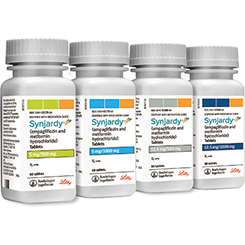If you or a loved one have taken (or affected by) Synjardy after October 2015 please contact us today.
Synjardy Increases Risks for Diabetic Ketoacidosis, Lactic Acidosis & Kidney Failure
Synjardy, the latest drug in the fight against Type 2 diabetes poses many of the same risks as other popular SGLT2 inhibitors including Invokana and Jardiance. If you or a loved one is currently taking Synjardy for treatment of Type 2 diabetes and experienced serious side effects, you may be entitled to compensation.

What is Synjardy?
Manufactured by Boehringer Ingelheim and introduced in September 2015, Synjardy is the newest drug available for the treatment of Type 2 diabetes. The drug combines the active ingredient empagliflozin, used in the popular SGLT2 inhibitor Jardiance, with metformin to create an alternative treatment for Type 2 diabetes in patients who have not responded to treatment with Jardiance alone.
Like all SGLT2 inhibitors, Synjardy helps lower blood sugar in Type 2 diabetes patients by inhibiting the reabsorption of glucose, while increasing the secretion of glucose in the kidneys. Treatment should be combined with changes in diet and exercise to be most effective.
What are the risks?
As is true with all SGLT2 inhibitors, Synjardy carries an increased risk for developing a condition known as diabetic ketoacidosis where ketones in the blood rise to dangerous levels. If left untreated diabetic ketoacidosis can lead to brain swelling, coma and death.
The FDA published a warning concerning the link between SGLT2 inhibitors and development of diabetic ketoacidosis in patients taking these medications in May of 2015. In December of the same year, new requirements were issued for manufacturer labeling by the FDA to include warnings on all SGLT2 inhibitors about the risks for ketoacidosis and urinary tract infections.
Because Synjardy also contains metformin, patients may also be susceptible to the development of another serious condition known as lactic acidosis, a condition related to metabolic functioning that causes a dangerous build up of lactate in the body. When not treated promptly lactic acidosis can be deadly in up to 50% of affected patients.